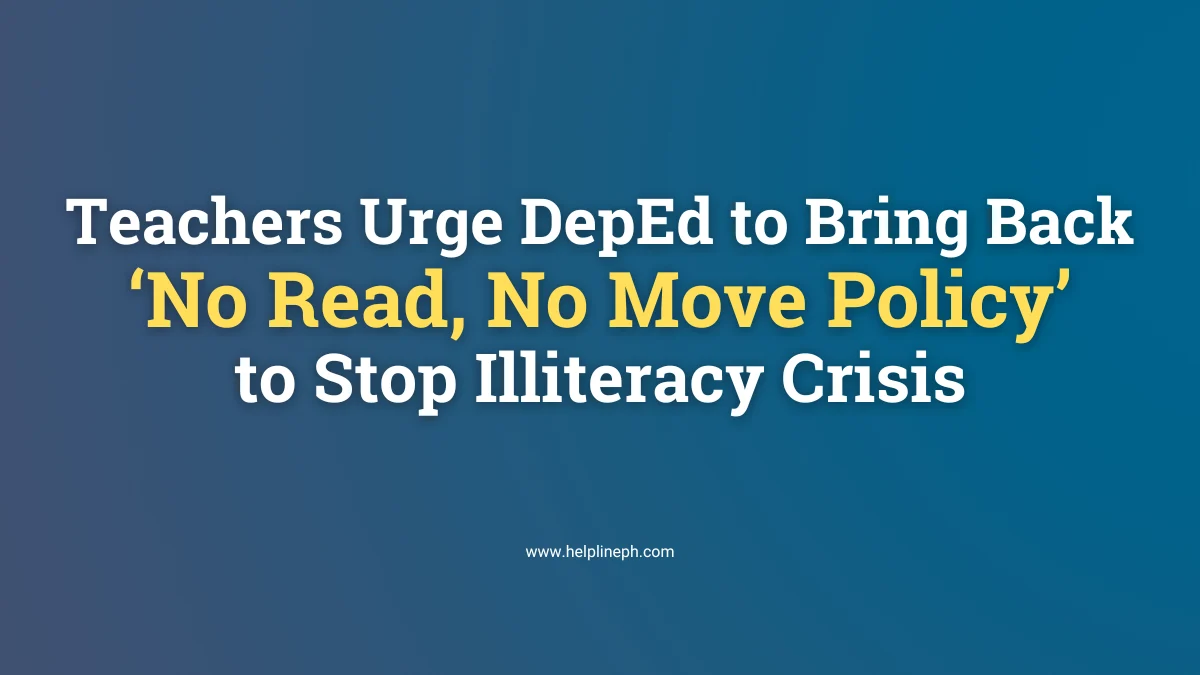Introduction: The Call for Change
No Read, No Move Policy is once again making headlines in the Philippines. Teachers are asking the Department of Education (DepEd) to bring back this strict rule to stop students from moving to the next grade if they cannot read. This call comes after a shocking report revealed that 18.9 million high school graduates in the country are functionally illiterate.
As a teacher myself, I understand why many of us are worried. If children cannot read in Grade 1, how can they understand lessons in higher grades?
Why Teachers Want the Policy Back
Many teachers believe that mass promotion—passing students even if they cannot read—is the main reason for the growing number of non-readers. They think that if the No Read, No Move Policy is enforced, students and parents will take reading more seriously.
Teachers who started teaching in the 1990s said the policy worked before. Students learned to read because they knew they might repeat Grade 1 if they failed.
What DepEd Says About the Policy
Education Secretary Juan Edgardo Angara said that DepEd does not officially allow mass promotion, but he admitted that the system needs reforms. He promised that no child will be left behind in learning to read and understand lessons.
However, many teachers are not convinced. They pointed out that DepEd Order No. 45, s. 2002—similar to the No Read, No Move Policy—was never fully enforced.
Why Reading Must Start Early
Experts and teachers agree that children must learn to read in Grade 1. Reading is the foundation of all learning. If a student cannot read, they will struggle with every subject, including math and science.
I have seen this in my own class. Students who can’t read by Grade 2 often lose confidence. By the time they reach high school, many just give up.
Will the Policy Work Again?
Supporters of the policy believe it will push students to try harder. They say some students and parents only become serious about school when they face the risk of repeating a grade.
But some critics worry that repeating a grade might discourage children. That’s why teachers are asking for strong support from parents and proper reading programs in schools.
Possible Solutions
- Strict Reading Assessments in Grade 1 – Teachers should regularly test reading skills.
- More Reading Programs – Schools must provide daily reading sessions.
- Parent Involvement – Parents should practice reading with their children at home.
- Better Teacher Training – Teachers need updated techniques to teach reading effectively.
Personal Reflection
As a teacher, I strongly believe that the No Read, No Move Policy can help if applied with compassion. The goal should not be to punish students but to make sure they truly learn. Reading is not just another subject—it is the key to all education.
Frequently Asked Questions (FAQs)
What is the No Read, No Move Policy?
It is a rule that prevents students from moving to the next grade if they cannot read at the required level.
Who wants the policy restored?
Teachers publicly asked DepEd to bring it back. Many others also support the idea.
Was the policy used before?
Yes, it was used in the 1990s for Grade 1 students. DepEd Order No. 45, s. 2002 later required reading skills by Grade 3, but it was not strictly enforced.
Why do teachers believe it is important?
They believe it will encourage students and parents to focus on reading early, preventing illiteracy in higher grades.
Will DepEd restore the policy?
DepEd has not confirmed it yet, but Secretary Angara promised to improve reading programs.






